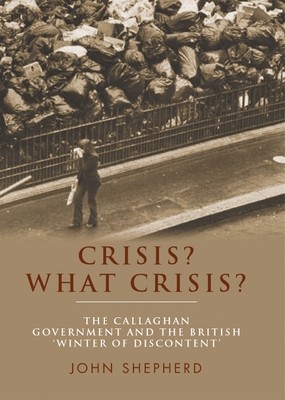
- We will send in 10–14 business days.
- Author: John Shepherd
- Publisher: Manchester University Press
- ISBN-10: 0719082471
- ISBN-13: 9780719082474
- Format: 15.8 x 23.6 x 2.3 cm, kieti viršeliai
- Language: English
- SAVE -10% with code: EXTRA
Reviews
Description
On 22 January 1979, one and a half million workers were on strike - the highest number since the 1926 General Strike. Iconic images in the media of the industrial unrest that swept Britain in an Arctic winter captured mountains of uncollected rubbish in London's theatre land; militant shop stewards turning patients away from hospitals and a national strike by road hauliers that threatened to bring the country to a standstill. Even corpses were left unburied. Within weeks the beleaguered Callaghan government fell from power by a single vote. In the 1979 general election, Margaret Thatcher became Prime Minister, beginning eighteen years of unbroken Conservative rule.
Over thirty years later, the British 'winter of discontent' still resonates in British politics and contemporary public rhetoric. This is the first full-length account of a major turning point in late twentieth-century Britain. Based on a wide range of recently available historical sources and key interviews with politicians, trade unionists, civil servants and journalists, it breaks new ground in analysing the origins, character and impact of this turbulent period. How did industrial relations break down between the government and the unions? Why was no state of emergency declared? Was the 'winter of discontent' inevitable or avoidable? Who was to blame - the Labour government or trade union power? This important study will appeal to all those interested in contemporary history and British politics.EXTRA 10 % discount with code: EXTRA
The promotion ends in 21d.13:52:17
The discount code is valid when purchasing from 10 €. Discounts do not stack.
- Author: John Shepherd
- Publisher: Manchester University Press
- ISBN-10: 0719082471
- ISBN-13: 9780719082474
- Format: 15.8 x 23.6 x 2.3 cm, kieti viršeliai
- Language: English English
On 22 January 1979, one and a half million workers were on strike - the highest number since the 1926 General Strike. Iconic images in the media of the industrial unrest that swept Britain in an Arctic winter captured mountains of uncollected rubbish in London's theatre land; militant shop stewards turning patients away from hospitals and a national strike by road hauliers that threatened to bring the country to a standstill. Even corpses were left unburied. Within weeks the beleaguered Callaghan government fell from power by a single vote. In the 1979 general election, Margaret Thatcher became Prime Minister, beginning eighteen years of unbroken Conservative rule.
Over thirty years later, the British 'winter of discontent' still resonates in British politics and contemporary public rhetoric. This is the first full-length account of a major turning point in late twentieth-century Britain. Based on a wide range of recently available historical sources and key interviews with politicians, trade unionists, civil servants and journalists, it breaks new ground in analysing the origins, character and impact of this turbulent period. How did industrial relations break down between the government and the unions? Why was no state of emergency declared? Was the 'winter of discontent' inevitable or avoidable? Who was to blame - the Labour government or trade union power? This important study will appeal to all those interested in contemporary history and British politics.

Reviews